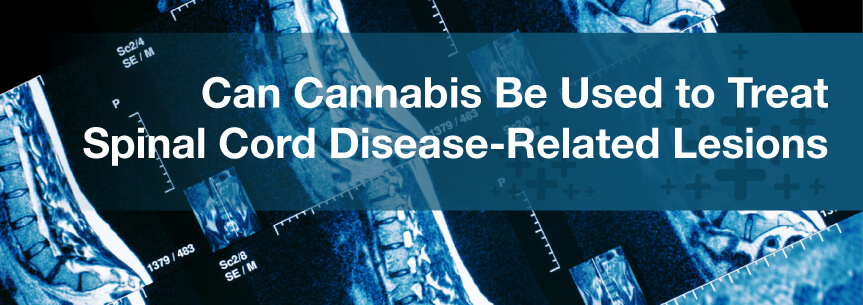
A potential complication that can arise when a patient has spinal cord disease is spinal lesions. Lesions on the spinal cord can be both extremely painful and difficult to manage. Depending on where the lesion is and its severity, it can cause other debilitating symptoms, as well.
When spinal cord disease leads to lesions on the spinal cord, there are limited treatment options available. However, medical marijuana can treat both the pain and associated symptoms caused by spinal lesions.
In simple terms, a spinal cord lesion is an abnormal change that occurs in the cells or tissue of the spinal cord. The spinal cord is an essential part of the central nervous system, which means any damage that occurs can interfere with its ability to transmit messages between the body and the brain.
Although spinal cord lesions can be caused by injury, they’re specifically caused by some underlying infection or disorder, such as multiple sclerosis, when they’re related to spinal cord disease.
Because of its key role in the nervous system, a lesion on the spinal cord can be accompanied by severe symptoms. Depending on the location of the lesion, it can impair motor and sensory function, as well as cause other debilitating side effects, such as:
The cannabinoids found in marijuana give the plant its medical benefits by interacting with receptors located in our body’s endocannabinoid system. These receptors can be found everywhere in the body and impact our nervous system, digestive system, emotional health and more.
The reason cannabis helps those with spinal cord lesions is because it can address many of the symptoms associated with this condition. If you have a spinal cord disease that has produced lesions, some of the benefits of medical marijuana include that it:
If you struggle with a disease that has caused lesions on your spinal cord, apply to your state’s medical marijuana program. Cannabis can help you manage your symptoms, and although it’s not a cure, it may allow your spinal cord some degree of recovery.
If you have specific questions about the benefits of medical marijuana, contact a marijuana doctor near you. They can assess your condition, offer you advice and help you start the process of becoming part of a compassionate cannabis program.